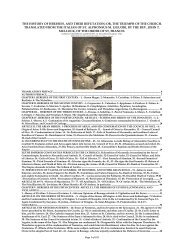The Writings of St. Francis of Assisi - + Saints' Works
The Writings of St. Francis of Assisi - + Saints' Works
The Writings of St. Francis of Assisi - + Saints' Works
You also want an ePaper? Increase the reach of your titles
YUMPU automatically turns print PDFs into web optimized ePapers that Google loves.
THE WRITINGS OF ST. FRANCIS OF ASSISI<br />
<strong>The</strong> Praises to be said at every hour<br />
[LaudHor]<br />
<strong>The</strong>se praises formed part <strong>of</strong> a short para-liturgical ceremony which <strong>St</strong>. <strong>Francis</strong> introduced for the<br />
purpose <strong>of</strong> recollecting the friars before the recitation <strong>of</strong> the Office <strong>of</strong> the Blessed Virgin Mary. Since Our<br />
Lady had only recently given <strong>St</strong>. Dominic the Holy Rosary, 226 the daily recitation <strong>of</strong> this <strong>of</strong>fice was still the<br />
most popular Marian devotion. <strong>The</strong> habit <strong>St</strong>. <strong>Francis</strong> had both <strong>of</strong> praising God and honoring the Blessed<br />
Virgin is a characteristic <strong>of</strong> his authentic Catholic spirit. <strong>The</strong> date <strong>of</strong> composition is uncertain, at least<br />
some years before his death in 1226 A.D.. 227<br />
Rubric: (Here) begin the praises which (our) most blessed Father <strong>Francis</strong> ordained and used to<br />
say at all the hours <strong>of</strong> the day and night and before the Office <strong>of</strong> the Blessed Virgin Mary,<br />
beginning thus: 'Most Holy, Our Father who art in heaven,' 228 etc.. with the 'Glory be.' <strong>The</strong>n the<br />
praises are to be said:<br />
Holy, holy, holy, Lord God Omnipotent, who is and who was and who is to come (cf. Apoc 4:8):<br />
And let us praise and exalt Him above all throughout the ages.<br />
Worthy are <strong>The</strong>e, Lord Our God, to accept praise, glory and honor, and blessing (cf. Apoc 4:11):<br />
And let us praise and exalt Him above all throughout the ages.<br />
Worthy is the Lamb, who has been slain to accept virtue and divinity 229 and wisdom and fortitude<br />
and honor and glory and blessing (Apoc 5:12):<br />
And let us praise and exalt Him above all throughout the ages.<br />
'Let us bless the Father and the Son with the Holy Spirit.' 230<br />
And let us praise and exalt Him above all throughout the ages.<br />
All you works <strong>of</strong> the Lord bless the Lord (Dan 3:57):<br />
And let us praise and exalt Him above all throughout the ages.<br />
Recite praise to Our God all you His servants and you who fear God, the very little and the great<br />
(cf. Apoc 19:5):<br />
And let us praise and exalt Him above all throughout the ages.<br />
Praise Him, the Glorious One, you heavens and earth (cf. Ps 68:35; Rom. Psalter):<br />
226 cf. Pope Leo XIII Magnae Dei Matris, n. 8 (Sept. 8, 1892 A.D.); and Octobri Mense, n. 8<br />
(Sept. 22, 1891 A.D.).<br />
227 cf. K. Esser, p. 394. K. Esser divides these praises into verses according to their structure, with<br />
the final prayer counted as verse 11, and the initial rubric omitted in the enumeration altogether.<br />
Words in italics are those peculiar to <strong>St</strong>. <strong>Francis</strong>' quotation <strong>of</strong> the verse.<br />
228 It should be noted that it was <strong>St</strong>. <strong>Francis</strong>' habit to begin the recitation <strong>of</strong> the Our Father by<br />
adding the word "Most Holy," cf. K. Esser, p. 394.<br />
229 At this point the Vulgate reads divinitatem, whereas the Greek reads pluton (riches). In<br />
Hebrew, Greek and Latin this pair <strong>of</strong> words had linguistic affinities, and for this reason in Latin<br />
divinitas (divinity) and divitias (riches) were on occasion used interchangeably; Likewise the<br />
Greek word means both "riches" and "Pluto," the god <strong>of</strong> wealth. In the West this reading was<br />
understood as Christ's reception <strong>of</strong> the divine honor due Him from men; for a discussion <strong>of</strong> this<br />
reading <strong>of</strong> the text cf. Cornelius à Lapide, Commentarii in Sacram Scripturam, Apoc. 5:12.<br />
230 A direct citation from the Breviarium Romanum ad Laudes Domincae vel e precibus<br />
Completorii.<br />
Page - 58













